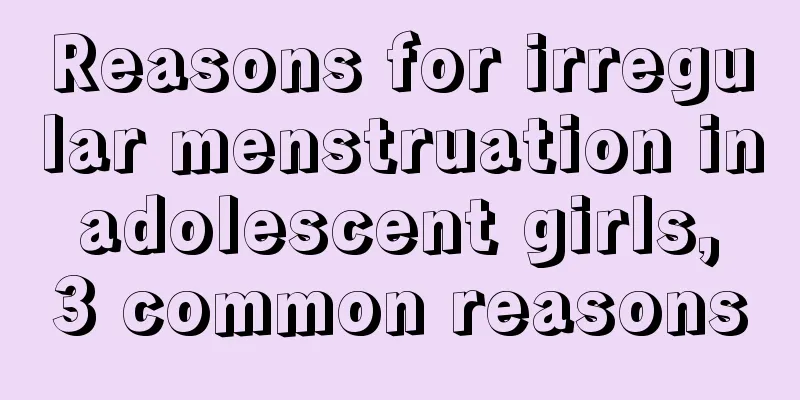Reasons for irregular menstruation in adolescent girls, 3 common reasons

|
Women are very prone to menstrual irregularities, especially married women, but what is the reason for menstrual irregularities during adolescence? It should be taken seriously. Irregular menstruation may also affect pregnancy, so the cause should be found and adjusted in time. 1. Causes of irregular menstruation in adolescent girls 1. During adolescence, the neuroendocrine regulatory function of the hypothalamus-pituitary-ovarian axis has not yet fully matured, leading to irregular menstruation. Although the follicles in the ovaries are mature, they do not ovulate. It is necessary to wait until the ovaries have completed their development and become fully functional before the eggs can mature and be released once a month, and then menstruation will come on time every month. 2. There are individual differences in the cyclical response of the endometrium to sex hormones. The physiological and psychological state of adolescence will affect the release of sex hormones and change the normal menstrual cycle rhythm. 3. Significant changes in the life and work of adolescent women can also lead to irregular menstruation. Generally speaking, environmental changes, excessive exercise, mood swings, or changes in life such as exams, moving, nutrition, etc. will affect the length of the menstrual cycle and the amount of menstrual blood discharged. 2. Symptoms of irregular menstruation in adolescent girls 1. The first menstruation is normal, and the second menstruation comes again 4-5 days after the second menstruation is over. This repeats for several months without cycle or regularity, and there are almost no clean days. The menstrual flow is less, and the color of the menstrual period may be bright red, brown, or sauce-colored. There may be no discomfort or only mild fatigue, and no treatment is needed. 2. Menstruation usually starts after the age of 18, and then becomes irregular, more or less, with the cycle gradually delayed and often stopping, and weight gain or hirsutism occurs. Medically, it is also called "oligomenorrhea" or "oligomenorrhea". 3. After menarche, the menstruation stops for several months, the menstrual flow is heavy or even like heavy bleeding, or there is an appearance of anemia. This symptom is mostly due to dysfunctional uterine bleeding during adolescence and must be treated in the hospital. Expert interpretation: Generally speaking, menstruation is mostly irregular in the first few years after menarche. It will take about 5 years for menstruation to occur on time with a certain regularity. For example, some girls have their period once every two months, and this pattern is normal. In the five years after menarche, it is very common to have menstruation once every two years. It does not indicate any abnormality in the body, nor will it affect growth and development, future marriage, childbearing, etc. |
<<: What to do if estradiol is low? Keep these things in mind at all times
Recommend
What causes breast lobular hyperplasia
Due to the increase in the incidence of lobular b...
Why do I feel sore and swollen calves in late pregnancy?
Women need to pay great attention to their body c...
I fell and lost my baby at 38 weeks of pregnancy
Many pregnant women worry about placental abrupti...
Side effects of taking short-term contraceptive pills
Many female friends do not understand the disadva...
What can I do to avoid pregnancy?
Nowadays, couples should try to undergo a premari...
Three months pregnant, there is blood in the toilet
Bleeding problems in any situation are a problem ...
Can pregnant women eat fairy grass?
Herba Immortalis can be made into desserts, and y...
What causes clitoral itching?
For women, they must learn to protect their repro...
What is the cause of occult blood in women's urine?
Many female friends will find that the results of...
Brown discharge before period
In life, many women will feel some physical sympt...
What is uterine prolapse surgery?
I believe everyone knows the importance of the ut...
Breast shrinkage after breastfeeding
Breastfeeding is a task that many women face. Sin...
Does more vaginal discharge during ovulation mean you have gynecological problems? Two of these five are true...
gossip "During ovulation, there is increased...
What are the raw materials for photosynthesis? What does photosynthesis produce?
Photosynthesis usually refers to the process by w...
What is the name of ancient scholars? What is a game that ancient scholars often played?
The aristocratic education system of the Zhou Dyn...









